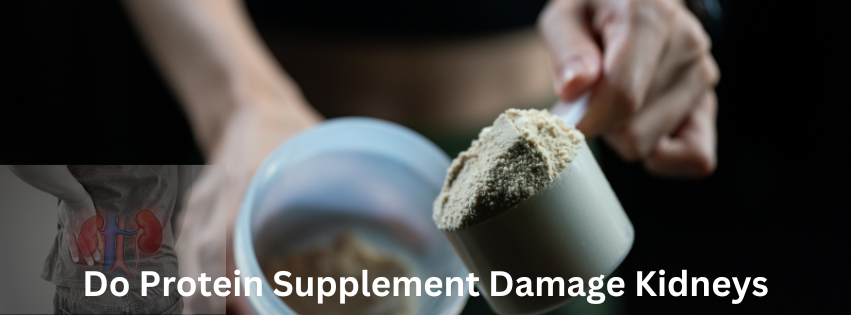Introduction
Protein shakes have become a popular supplement, especially among athletes, bodybuilders, and those looking to lose weight or build muscle. However, there is a common concern about whether these shakes can damage the kidneys. This article will explore this topic in simple terms, providing a clear understanding of how protein shakes affect kidney health.
Understanding Protein and Kidneys

Protein is a crucial nutrient that plays many important roles in the body, such as building and repairing tissues, producing enzymes and hormones, and supporting immune function. It’s often associated with muscle building and weight management, which is why many people turn to protein shakes as a convenient way to increase their protein intake.
However, concerns have been raised about the potential impact of consuming high amounts of protein, including through protein shakes, on kidney health. The kidneys are responsible for filtering waste products from the blood and regulating fluid balance in the body. Some worry that a high-protein diet may put extra strain on the kidneys, leading to kidney damage over time.
Research on this topic has produced mixed results. While some studies suggest that a high-protein diet may increase the risk of kidney problems, particularly in individuals with pre-existing kidney disease, others indicate that for healthy individuals, consuming moderate amounts of protein is unlikely to cause harm to kidney function.
It’s essential to consider several factors when evaluating the relationship between protein intake and kidney health. These include the source and quality of protein consumed, individual health status, hydration levels, and overall dietary habits. Additionally, consulting with a healthcare professional or registered dietitian can provide personalized guidance on protein intake and its impact on kidney health based on individual needs and health goals.
while the relationship between protein intake and kidney health is complex, consuming protein, including through protein shakes, in moderation as part of a balanced diet, is generally considered safe for most individuals. However, those with existing kidney issues should exercise caution and seek guidance from healthcare professionals to ensure optimal kidney health.
The Role of Protein Shakes
Concerns About Kidney Damage

Protein shakes have become increasingly popular as a convenient and efficient way to supplement protein intake, especially among those involved in sports, fitness, and weight management. These beverages typically contain a concentrated source of protein, often derived from whey, casein, soy, or other plant-based sources.
The primary role of protein shakes is to provide a quick and convenient source of protein, which is essential for various bodily functions. Protein is crucial for building and repairing tissues, supporting muscle growth and recovery, and regulating important processes in the body.
For athletes and individuals engaged in regular exercise, protein shakes can be particularly beneficial. Consuming protein shortly after a workout can help promote muscle repair and growth, enhance recovery, and support overall performance.
Additionally, protein shakes can be a convenient option for those who struggle to meet their daily protein needs through whole foods alone, whether due to dietary preferences, time constraints, or other factors.
However, it’s important to note that protein shakes should not replace whole, nutrient-rich foods in the diet. While they can be a convenient supplement, they should be viewed as just one component of a balanced diet that includes a variety of fruits, vegetables, whole grains, and other protein sources.
Furthermore, the quality and ingredients of protein shakes can vary widely, so it’s essential to choose products from reputable brands that provide high-quality protein and minimal added sugars, artificial flavors, and other additives.
Overall, protein shakes can play a valuable role in supporting protein intake, muscle growth, and exercise recovery when used as part of a balanced diet and healthy lifestyle. However, it’s essential to consume them in moderation and in conjunction with a varied and nutrient-rich diet to reap their full benefits.
What Does Science Say?
 There are concerns among some people about the potential for kidney damage associated with the consumption of protein shakes, particularly when consumed in large quantities or over a prolonged period. The kidneys play a vital role in filtering waste products from the blood and regulating fluid balance, and there is a worry that excessive protein intake may place undue stress on these organs.
There are concerns among some people about the potential for kidney damage associated with the consumption of protein shakes, particularly when consumed in large quantities or over a prolonged period. The kidneys play a vital role in filtering waste products from the blood and regulating fluid balance, and there is a worry that excessive protein intake may place undue stress on these organs.
While research on the topic is ongoing, some studies suggest that a high-protein diet may increase the risk of kidney problems, especially in individuals with pre-existing kidney disease or other health conditions. The rationale is that the kidneys must work harder to process and eliminate the byproducts of protein metabolism, potentially leading to kidney strain over time.
However, it’s essential to note that the evidence linking protein intake to kidney damage is not conclusive, and much of the concern arises from studies conducted on individuals with existing kidney issues or those consuming extremely high amounts of protein, well beyond what is typically recommended.
For most healthy individuals, moderate protein intake, including the protein supplement consumption of protein shakes, is unlikely to cause harm to kidney function. It’s crucial to consider factors such as overall diet quality, hydration levels, and individual health status when evaluating the potential impact of protein intake on kidney health.
Nevertheless, those with existing kidney problems or concerns about kidney health should exercise caution and consult with healthcare professionals before significantly increasing their protein intake or relying heavily on protein shakes as a dietary staple. Additionally, choosing high-quality protein sources and consuming protein shakes in moderation can help mitigate any potential risks associated with kidney health.
while concerns about kidney damage associated with protein shakes exist, particularly among certain populations, the evidence is not definitive. Moderate protein intake, along with a balanced diet and healthy lifestyle, is generally considered safe for most individuals. However, those with kidney issues or concerns should seek personalized guidance from healthcare professionals.
 Scientific research on the relationship between protein intake, including protein shakes, and kidney health has produced mixed findings. While some studies suggest a potential link between high-protein diets and kidney damage, particularly in certain populations, others indicate that moderate protein intake is generally safe for most individuals.
Scientific research on the relationship between protein intake, including protein shakes, and kidney health has produced mixed findings. While some studies suggest a potential link between high-protein diets and kidney damage, particularly in certain populations, others indicate that moderate protein intake is generally safe for most individuals.
A comprehensive review published in the Journal of Nutrition concluded that there is limited evidence to support the notion that high-protein diets adversely affect kidney function in healthy individuals. However, individuals with pre-existing kidney disease or other health conditions may need to exercise caution and monitor their protein intake.
Another study published in the American Journal of Kidney Diseases found that while high-protein diets may increase certain risk factors for kidney disease, such as hyperfiltration, there is insufficient evidence to suggest a direct causal relationship between protein intake and kidney damage in healthy individuals.
Furthermore, a meta-analysis published in the Journal of the International Society of Sports Nutrition concluded that protein supplementation, including protein shakes, does not adversely affect kidney function in healthy adults engaging in resistance training.
Overall, the consensus among researchers is that moderate protein intake, within recommended dietary guidelines, is unlikely to cause harm to kidney function in healthy individuals. However, those with existing kidney issues or concerns about kidney health should consult with healthcare professionals for personalized guidance.
It’s important to consider individual factors such as overall diet quality, hydration levels, and health status when evaluating the potential impact of protein intake on kidney health. Additionally, choosing high-quality protein sources and consuming protein shakes in moderation can help mitigate any potential risks associated with kidney health.
Healthy Individuals: Research indicates that for healthy individuals with no pre-existing kidney conditions, high-protein diets, including those supplemented with protein shakes, do not typically cause kidney damage. Studies have shown that the kidneys in healthy people can adapt to higher levels of protein intake without adverse effects.
People with Kidney Issues: For individuals with kidney disease or impaired kidney function, high protein intake can be problematic. In such cases, doctors often recommend a lower protein diet to reduce the burden on the kidneys and prevent further damage.
Moderation is Key

When it comes to consuming protein shakes or any dietary supplement, moderation is essential. While protein shakes can be a convenient way to increase protein intake and support various health goals, including muscle building and weight management, excessive consumption can potentially lead to adverse effects, including concerns about kidney health.
For most individuals, incorporating protein shakes into a balanced diet in moderation is unlikely to cause harm. However, it’s crucial to consider factors such as overall dietary habits, hydration levels, and individual health status.
Choosing high-quality protein sources and opting for protein shakes with minimal added sugars, artificial flavors, and other additives can help ensure that you’re getting the most nutritional benefit from these supplements.
Additionally, it’s essential to remember that protein shakes should not replace whole, nutrient-rich foods in the diet. They should be viewed as a supplement to support protein intake, rather than a primary source of nutrition.
Overall, moderation and balance are key principles to keep in mind when incorporating protein shakes into your diet. Consulting with healthcare professionals or registered dietitians can provide personalized guidance on protein intake and dietary choices based on individual needs and health goals. By practicing moderation and making informed choices, you can enjoy the benefits of protein shakes while minimizing any potential risks.
Potential Side Effects of Excessive Protein

The kidneys are responsible for filtering waste products from the blood, and processing excess protein can increase the kidneys’ workload. Over time, this extra strain may lead to kidney damage or dysfunction, especially in individuals with pre-existing kidney conditions.
Dehydration: High-protein diets can increase the body’s need for water. When the body metabolizes protein, it produces waste products that must be eliminated through urine. This process requires adequate hydration. Without enough water, the kidneys may struggle to excrete waste efficiently, leading to dehydration.
Digestive Issues: Consuming large amounts of protein, especially from certain sources like protein powders, can cause digestive discomfort such as bloating, gas, and constipation. Some people may also experience nausea or stomach cramps when consuming excessive protein.
Nutritional Imbalance: Focusing too much on protein intake may lead to neglecting other essential nutrients, such as carbohydrates, fats, vitamins, and minerals. A balanced diet that includes a variety of foods is essential for overall health and well-being. Overemphasis on protein consumption at the expense of other nutrients can result in nutritional deficiencies over time.
Weight Gain: While protein is important for muscle building and repair, consuming excessive amounts of protein beyond what the body needs can lead to excess calorie intake. If not utilized for energy or muscle synthesis, these extra calories can be stored as fat, potentially leading to weight gain over time.
Increased Risk of Chronic Diseases: Some research suggests that long-term consumption of high-protein diets, particularly those high in animal-derived proteins, may be associated with an increased risk of certain chronic diseases, such as heart disease, cancer, and osteoporosis. However, more research is needed to fully understand these potential associations.
Adverse Effects on Bone Health: High-protein diets may affect calcium balance in the body, potentially leading to increased calcium excretion in urine and reduced calcium absorption in the bones. Over time, this could weaken bones and increase the risk of osteoporosis or bone fractures.
Overall, while protein is an essential nutrient, it’s important to consume it in moderation as part of a balanced diet. Individual protein needs vary based on factors such as age, gender, activity level, and health status. Consulting with a healthcare professional or registered dietitian can help determine appropriate protein intake levels and ensure overall dietary balance and health.
Practical Tips for Safe Protein Shake Use
 Choose High-Quality Products: Opt for protein shakes from reputable brands that use high-quality ingredients and minimal additives. Look for products that are third-party tested for purity and potency to ensure safety and effectiveness.
Choose High-Quality Products: Opt for protein shakes from reputable brands that use high-quality ingredients and minimal additives. Look for products that are third-party tested for purity and potency to ensure safety and effectiveness.Read Labels Carefully: Pay attention to the nutritional content and ingredient list of protein shakes. Avoid products with excessive added sugars, artificial flavors, or preservatives. Select options with a balanced macronutrient profile and a good source of essential vitamins and minerals.
Follow Serving Recommendations: Stick to the recommended serving size provided on the product label. Avoid consuming excessive amounts of protein shakes, as this can lead to potential side effects such as kidney strain or digestive issues.
Stay Hydrated: Protein metabolism requires adequate hydration to support kidney function and eliminate waste products. Drink plenty of water throughout the day, especially when consuming protein shakes, to maintain proper hydration levels and support overall health.
Pair with Balanced Meals: Use protein shakes as a supplement to, rather than a replacement for, whole, nutrient-rich foods in your diet. Incorporate protein shakes into balanced meals and snacks that include a variety of fruits, vegetables, whole grains, and healthy fats to ensure adequate nutrition.
Time Consumption Appropriately: Consume protein shakes at strategic times to maximize their benefits. For example, drinking a protein shake shortly after exercise can help support muscle recovery and growth. Additionally, incorporating protein shakes into meals or snacks can help balance blood sugar levels and promote satiety.
Monitor for Adverse Reactions: Pay attention to how your body responds to protein shakes. If you experience any digestive discomfort, allergic reactions, or other adverse effects after consuming protein shakes, discontinue use and consult with a healthcare professional.
Consider Individual Needs: Determine your protein needs based on factors such as age, gender, activity level, and health status. Tailor your protein intake and supplementation accordingly to meet your individual nutritional requirements and health goals.
By following these practical tips, you can safely incorporate protein shakes into your diet as part of a balanced and healthy lifestyle. Always prioritize quality, moderation, and personalized nutrition guidance for optimal results and overall well-being.
Proper Use and Dosage of Protein
 Protein shakes can be a convenient and effective way to supplement your diet with additional protein, whether you’re looking to build muscle, recover from exercise, or simply increase your protein intake. However, using protein shakes properly and determining the right dosage for your needs is essential to maximize their benefits while minimizing any potential risks. Here are some guidelines for proper use and dosage:
Protein shakes can be a convenient and effective way to supplement your diet with additional protein, whether you’re looking to build muscle, recover from exercise, or simply increase your protein intake. However, using protein shakes properly and determining the right dosage for your needs is essential to maximize their benefits while minimizing any potential risks. Here are some guidelines for proper use and dosage:
1. Determine Your Protein Needs:
Before incorporating protein shakes into your diet, it’s essential to assess your protein requirements. Factors such as age, gender, weight, activity level, and fitness goals will influence how much protein you need each day.
2. Calculate Your Daily Protein Intake:
The Recommended Dietary Allowance (RDA) for protein is approximately 0.8 grams per kilogram of body weight for the average adult. However, athletes and individuals engaged in intense physical activity may require higher amounts, ranging from 1.2 to 2.2 grams per kilogram of body weight.
3. Choose High-Quality Protein Shakes:
Opt for protein shakes made from high-quality protein sources, such as whey, casein, soy, or pea protein. Look for products with minimal added sugars, artificial ingredients, and unnecessary fillers.
4. Timing of Protein Shake Consumption:
The timing of protein shake consumption can impact its effectiveness. Consuming a protein shake within 30 minutes to an hour after a workout can help promote muscle recovery and growth. You can also use protein shakes as meal replacements or snacks throughout the day to support overall protein intake.
5. Dosage Guidelines:
The optimal dosage of protein shakes will vary depending on individual factors such as goals, dietary habits, and protein requirements. As a general guideline:
- For post-workout recovery: Aim for 20 to 30 grams of protein per shake.
- For meal replacement: Adjust the protein content based on your overall meal plan, aiming for a balanced macronutrient profile.
- For general protein supplementation: Consider consuming one to two protein shakes per day, as needed to meet your protein goals.
6. Monitor Your Intake:
Keep track of your daily protein intake from all sources, including protein shakes, whole foods, and other supplements. Be mindful not to exceed your daily protein requirements, as excessive protein intake can strain the kidneys and may lead to other health issues.
7. Hydration:
Ensure adequate hydration by drinking plenty of water throughout the day, especially when consuming protein shakes, as they can increase urine output.
8. Consult a Professional:
If you’re unsure about how to incorporate protein shakes into your diet or have specific health concerns, consult with a healthcare provider, registered dietitian, or nutritionist for personalized recommendations.
Conclusion
Protein shakes can be a valuable addition to your diet, providing a convenient and efficient way to increase protein intake and support various health and fitness goals. When used properly, protein shakes can aid in muscle recovery, promote muscle growth, and contribute to overall nutritional balance. However, it’s essential to determine your individual protein needs, choose high-quality products, and monitor your intake to avoid excessive consumption.
By following proper usage and dosage guidelines, you can enjoy the benefits of protein shakes while minimizing any potential risks. Remember to maintain a balanced diet, stay hydrated, and consult with a healthcare professional if you have any concerns or specific health conditions. With mindful and informed use, protein shakes can be a valuable tool in helping you achieve your health and fitness goals.
FAQS
1. Are protein shakes only for bodybuilders?
No, protein shakes are not just for bodybuilders. While they are commonly used by athletes and fitness enthusiasts to support muscle growth and recovery, protein shakes can be beneficial for anyone looking to increase their protein intake, such as individuals following vegetarian or vegan diets, older adults, or those recovering from illness or injury.
2. Can I replace meals with protein shakes for weight loss?
Protein shakes can be used as meal replacements as part of a weight loss plan, but it’s essential to ensure they provide a balanced mix of nutrients, including carbohydrates, fats, vitamins, and minerals. Meal replacement shakes should be used in conjunction with a healthy diet and regular exercise and under the guidance of a healthcare professional or registered dietitian.
3. Are there any side effects of consuming too much protein from shakes?
Consuming excessive amounts of protein, whether from shakes or other sources, can potentially lead to digestive issues such as bloating, gas, and constipation. In some cases, very high protein intake over long periods may also strain the kidneys and increase the risk of kidney damage, especially in individuals with pre-existing kidney conditions. It’s essential to consume protein shakes in moderation and within recommended daily protein intake limits.
4. When is the best time to drink a protein shake?
The timing of protein shake consumption depends on your individual goals and preferences. Many people choose to drink a protein shake within 30 minutes to an hour after a workout to support muscle recovery and growth. Protein shakes can also be consumed as meal replacements or snacks throughout the day to help meet overall protein needs. Ultimately, the best time to drink a protein shake is whenever it fits into your daily routine and supports your nutritional goals.
5. Can I make my own protein shakes at home?
Yes, you can easily make your own protein shakes at home using a variety of ingredients such as protein powder, milk or a milk alternative, fruits, vegetables, nut butters, and other add-ins like oats or Greek yogurt. Making homemade protein shakes allows you to customize the ingredients to your taste preferences and nutritional needs while avoiding added sugars and artificial ingredients often found in pre-packaged shakes.

